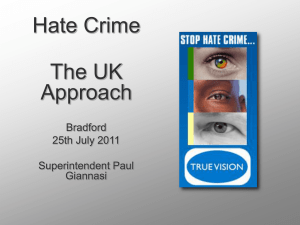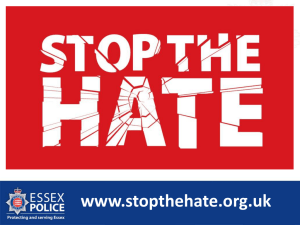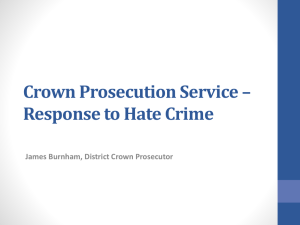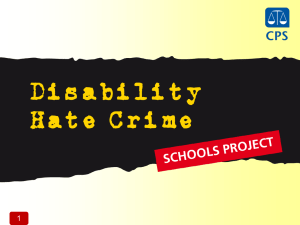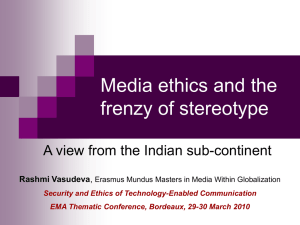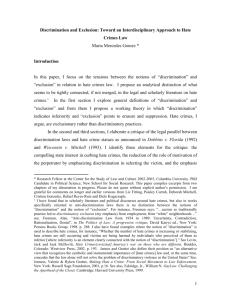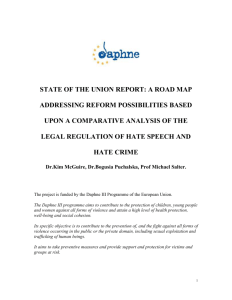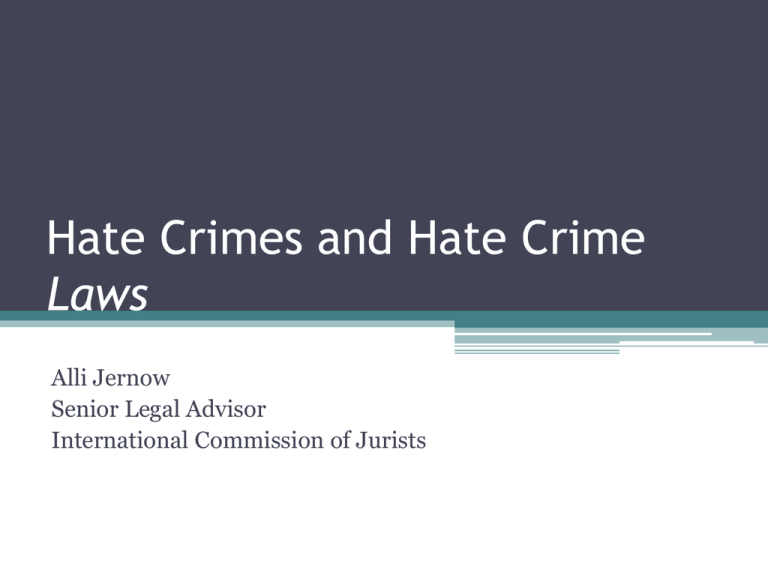
Hate Crimes and Hate Crime
Laws
Alli Jernow
Senior Legal Advisor
International Commission of Jurists
2
What’s a hate crime?
• Two parts: Criminal conduct + Motive
• What is criminal conduct?
• What is motive?
3
Criminal conduct
• Assault, murder, threats, vandalism, arson . . .
anything that is listed in the Criminal Code.
• But not typically: SPEECH.
• Hate speech ≠ Hate crime
4
Motives
• “I need money … to pay my rent.”
• “I need money and I’ve selected you – gay man –
because you’ll be afraid to go to the police.”
▫ (But I’ve got nothing against gay men! My
brother’s gay! I’m gay!)
• “I’m going to bash your face in, and leave your
wallet on the ground, just because I think you’re
gay.”
▫ (What if the victim isn’t gay??)
5
What’s a hate crime law?
• Defines conduct that is criminal and imposes
penalty (fine, prison sentence).
• Purpose: to prohibit certain conduct and to
punish people for engaging in such conduct.
• Defines conduct
▫ Elements of crime
▫ To be proven by State at trial of accused
▫ With evidence
6
Important point!
• Hate crime laws aren’t always called “hate crime
laws.”
• But laws that impose extra penalty for
discriminatory motive are hate crime laws.
• The name is less important than the function.
• Data collection laws are not hate crime laws.
7
Structure of hate crime laws
• Criminal conduct
• With a certain motive
▫ What kind of motive?
• Directed against a group or characteristic
▫ What’s a group or characteristic?
• Substantive offense vs. aggravating circumstance
8
Descriptions of motive
• France: Penalty is increased when the offense is
committed because of membership or nonmembership, true or supposed, of the victim to an ethnic
group, nation, race or religion.
▫ Art. 132-76 Code Pénal
• Belgium: Increase of two years when “one of the motives
is hatred against, contempt for or hostility to a
person” on certain grounds.
▫ Art. 377bis Code Pénal
• Descriptions of motive:
▫ Hate, bias, animosity
▫ Racist, xenophobic, homophobic
▫ Because of, on account of
9
Protected groups/characteristics
• Protected groups:
▫ LGBT, sexual minorities, disabled, Roma, Muslims
• Protected characteristics:
▫ Sexual orientation, gender identity, ethnicity, race
• Mistakes of perception, affiliation, association
• UK: aggravated offense if offender demonstrates
hostility based on victim’s membership or
presumed membership in a racial or religious
group. Membership includes association with
members of that group.
▫ Section 28 Crime and Disorder Act 1998
10
Substantive offense vs. aggravated
circumstances
• Aggravated circumstance = factor that increases
seriousness of offense
• Czech Republic: Using violence against
individual because of his/her political
conviction, nationality, race, creed or lack of
creed.
▫ Art. 196(2) Criminal Code
11
International commitments: states
should
• “Take all reasonable steps to unmask any racist
motive and to establish whether or not ethnic hatred
or prejudice may have played a role in the events.
Failing to do so and treating racially induced
violence and brutality on an equal footing with cases
that have no racist overtones” may violate Article 14.
▫ Nachova v. Bulgaria, ECtHR 2005
▫ Milanovic v. Serbia, ECtHR 2010 (religion)
▫ Differences based on sexual orientation treated like
differences based on race, sex. Salgueiro da Silva
Mouta v. Portugal.
12
States should
• “Take necessary measures to ensure that racist
and xenophobic motivation is considered an
aggravating circumstance, or, alternatively, that
such motivation may be taken into consideration
by the courts in the determination of the
penalties.”
▫ Framework Decision on Racism and Xenophobia
2008
13
States should
• Ensure that all allegations of attacks and threats
against individuals targeted because of their
sexual orientation or gender identity are
thoroughly investigated.
• Define hate speech and hate crimes based on
sexual orientation or gender identity as crimes.
▫ UN Human Rights Committee (Concluding
Observations re Poland 2010)
▫ Similar comments by CEDAW (Concluding
Observations re South Africa 2011)
14
States should
• Ensure effective, prompt and impartial
investigations into alleged cases of crimes and other
incidents, where the sexual orientation or gender
identity of the victim is reasonably suspected to have
constituted a motive for the perpetrator;
• Ensure that when determining sanctions, a bias
motive related to sexual orientation or gender
identity may be taken into account as an aggravating
circumstance.
▫ Committee of Ministers Recommendation (2010)5
15
National laws
• Most commonly protected: race, religion
▫ “racially motivated hatred” or “ religiously
motivated hatred”
• Sexual orientation:
▫ 15 states within CoE (Andorra, Belgium, Croatia,
Denmark, France, Greece, Lithuania, NL, Norway,
Portugal, Romania, Slovenia, Spain, Sweden &
UK)
▫ 18 states have laws criminalizing incitement on SO
• Gender identity: 1 (Scotland)
16
What can we do without hate crime
laws?
• Hate crimes vs. hate crime laws
• Hate crime law - motive = criminal conduct
• Purposes of hate crime law
▫ Why do we have criminal laws?
▫ What can we achieve without specific hate crime
laws?



